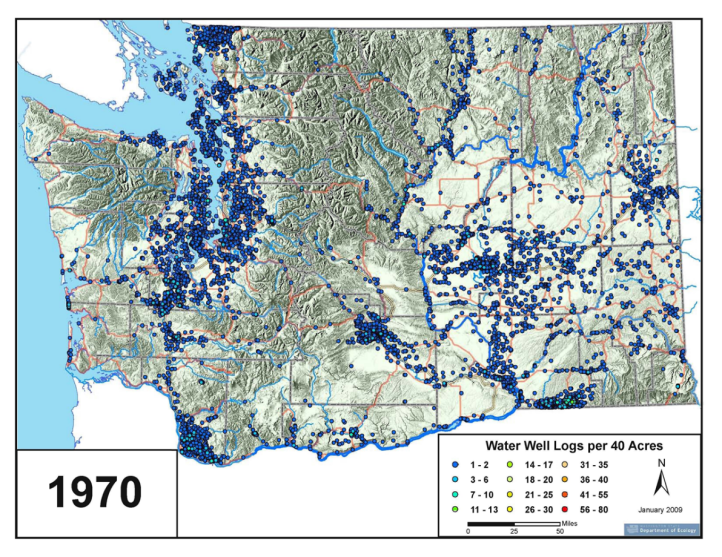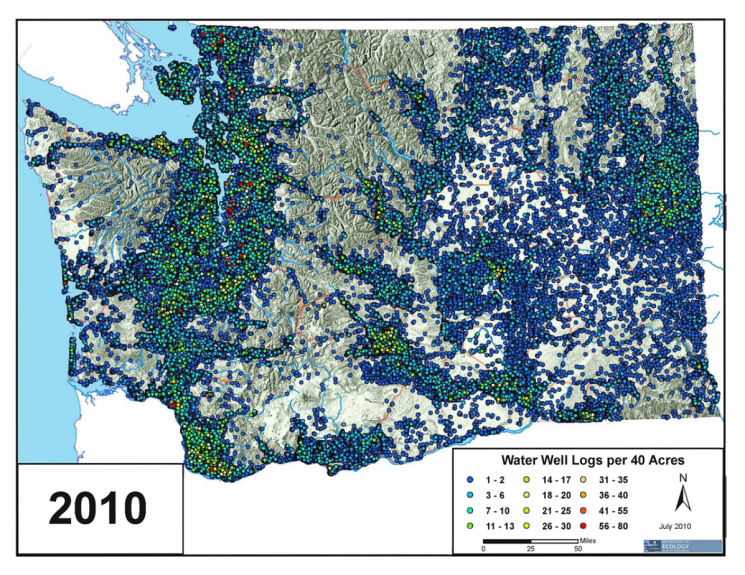Protecting Aquifers
Over 60% of Washington’s drinking water comes from groundwater; aquifers are what store that water. CELP is the leading conservation organization ensuring the Dept. of Ecology uses its full authority under state law to protect the sustainable management of our aquifers.
Water is Life
Access to sufficient, safe, and affordable water for personal and domestic use is a human right. As our state’s population swells, our government has the responsibility to ensure the protection of that right.
Anyone who calls Washington home knows our state is growing. In fact, the latest census data shows that Washington’s population increased by over 14% between 2000 and 2020, the seventh fastest growing state overall. And all that economic growth cannot occur without water. All uses of land—whether it be agricultural, residential commercial or industrial—require access to reliable water supplies. While the relationship between land use and water is fundamental, until recently our land use laws almost entirely failed to recognize that future growth depends upon sustainable water resources. CELP is working statewide to better integrate wise water management with the land use permitting process.
Furthermore, economic growth cannot occur without water. All uses of land (whether it be agricultural, residential commercial or industrial) require access to reliable water supplies. While the relationship between land use and water is fundamental, our land use laws (until recently) almost entirely failed to recognize that future growth depends upon sustainable water resources. To protect our aquifers, CELP is working statewide to better integrate wise water management with the land use permitting process.
A Dangerous Loophole
In 1945, the Legislature established the Groundwater Code, Chapter 90.44 RCW. In the code, at RCW 90.44.050, certain small withdrawals of groundwater were identified as ‘exempt’ from the state’s water right permitting process. This law is commonly referred to as the “groundwater permit exemption.” This exemption allows for four uses of groundwater without a water right permit: 1) domestic uses of up to 5,000 gal/day, 2) industrial uses of up to 5,000 gal/day, 3) irrigation of a lawn or garden, a half-acre or less in size, and 4) water for livestock.
As a result of this loophole, over 1 million permit-exempt wells now exist throughout Washington state. While each individual exemption might be used for a “small” or “trivial” amount of water, the scale at which these exemptions have been utilized has added up to a significant drain on our state’s water supply and is leading to issues. Because of hydraulic continuity—the underground link between aquifers and streams—pumping groundwater often siphons water away from nearby streams and rivers. As a result other wells are running dry and streamflows in our waterways are rapidly diminishing leading to the curtailment of water rights and threatening the health of aquatic ecosystems.



CELP’s Work to Protect Our Aquifers
CELP is focused on closing, or at least minimizing, this loophole, and integrating sound water management into land use planning. We cannot make land use decisions without ensuring that new water uses will not harm existing private uses nor the public’s interest in healthy rivers and sustainable aquifers.
Won Precedent-Setting Recognition of Hydraulic Continuity
CELP provided legal support in Postema v Pollution Control Hearing Board which established an important State Supreme Court precedent of interpreting water availability in relation to instream flow rules. In the 2000 decision, the Court held that ground water is not available if its withdrawal would have “any effect” on a stream closed to further appropriation, or if it would impair a minimum flow established by regulation. It also established that Ecology may use new scientific methods as they become available.
Shut Down Issuance of New Groundwater Rights In Yakima River Basin
In 1998—in the midst of the length and complex adjudication process—CELP advocated for a moratorium on issuing new groundwater rights in the Yakima River Basin to ensure a complete, equitable, and accurate process.
Introduced Bill Sponsored by Senator John McCoy
During the 2018 Legislative session, CELP introduced SB 6316 to address the impact of permit-exempt wells and their impact on hydraulic continuity. If passed, the bill would have effectively shrunk the exempt well loophole by requiring the certification and evidence of adequate and available water prior to drilling.
After the first reading, the bill was referred to Agriculture, Water, Natural Resources & Park, but failed to pass out of committee.
Protected Critical Trumpeter Swan Habitat
Located on the tip of the Long Beach Peninsula lies a unique bird and wildlife habitat. With ocean front dunes, a mature Sitka spruce forest, marsh wetlands, and proximity of upland forest to wetlands, Leadbetter State Park is home to 25 sensitive habitat communities and species monitored by the Washington Department of Natural Resources Natural Heritage Program. Among those who call the area home are Trumpeter Swans, who overwinter in Hines Marsh. But this valuable habitat hasn’t always provided such sanctuary…
After decades of misuse, Hines Marsh was illegally drained in 1998 by a land developer. Thanks to the efforts of several conservation groups, including the Trumpeter Swan Society, a water control and fish ladder structure was installed in 2001 to restore the stability of water flow in and out of the marsh. In 2007, CELP utilized its legal expertise to draw attention to and challenge proposed groundwater use by a neighboring property owner, ensuring all withdrawals secured the proper water permits under RCW 90.44.050, preventing a devastating repeat of 1998.
Petition Leads to First-of-its-Kind Emergency Closure of Groundwater Withdrawls in Kittias County
Since 1998, nearly 3,000 wells had been drilled in Kittitas County, prompting concerns that groundwater pumping in the headwaters region of the county threatens senior water users and streamflows in the Yakima Basin. A number of parties, including the citizens group Aqua Permanente, the Yakama Nation, and the city of Roslyn, asked that Ecology close the groundwater to further appropriation while a groundwater study is completed.
In support of their efforts, CELP offered legal advice and filed briefs on behalf of the family farmers who formed the citizen action group, Aqua Permanente. Ultimately, a groundwater study designed to gain a better understanding of the connection between groundwater and surface waters was funded by the Legislature in 2008. A head of the study’s start date in 2009, Ecology filed an emergency rule to close upper Kittias County to all new groundwater withdrawls without full mitigation. This ruling was the first of its kind in Washington state.
Instrumental in Approval of WRIA 9 Watershed Plan
CELP’s staff and volunteers were instrumental in the development of the Watershed Plan for WRIA 9 (Duwamish-Green). Under their advisement, the planning group focused on ensuring the impacts from new domestic permit-exempt (PE) wells will be adequately assessed and offset.
As mandated by the Streamflow Restoration law enacted in 2018, in coordination with WRIA planning groups, Ecology adopted the Duwamish-Green Watershed Restoration and Enhancement Plan in May 2021 and is working to track its progress.
